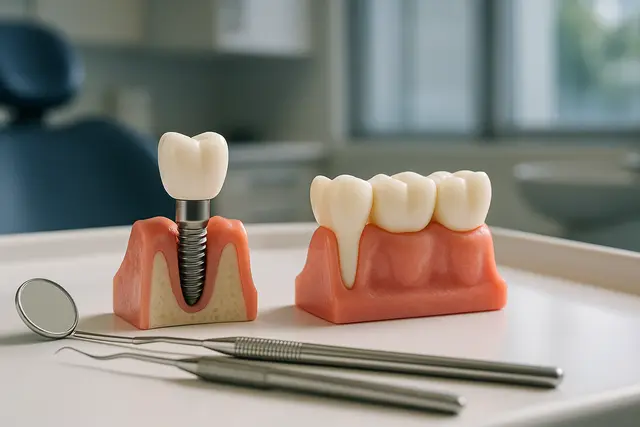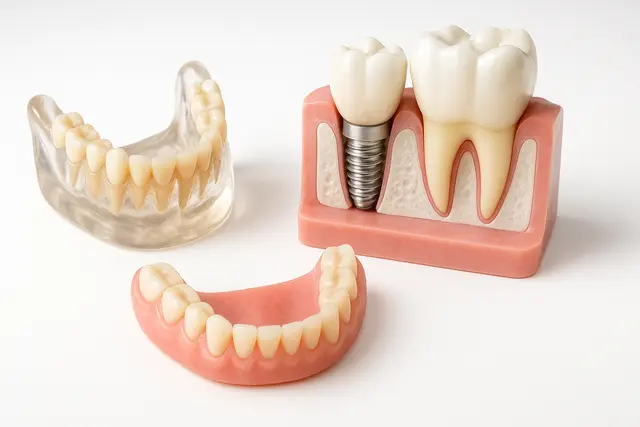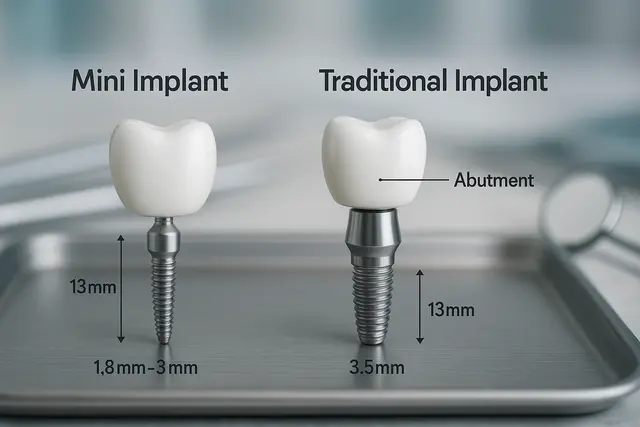Prosthodontics
5 min read
Oct 21, 2025
Single Tooth Implant vs. Bridge: Pros and Cons
Missing a tooth can feel overwhelming, but you're not alone. Whether it’s from an injury, decay, or an unexpected mishap, choosing the right way to replace it is a big decision. Two of the most common options are dental implants and bridges, each with its own benefits and trade-offs. Understanding the differences can help you make a confident, informed choice for your smile and long-term oral health.

So, you’re missing a tooth. First off, don’t panic. It happens to the best of us, sports injuries or surprise cavities. But now you're faced with a big decision: do you go for a dental implant or a bridge?
This isn’t just about filling a gap. It’s about your smile, your bite, and let’s be honest, your wallet too. If you’re wondering whether a dental bridge or implant is the best tooth replacement option for you, you're in the right place.
Let’s explore the real-world pros and cons of dental bridges and dental implants so you can confidently decide what makes sense for your mouth, and your life.
Dental Implant: What It Is and Why People Love It
A dental implant is basically a tiny titanium post that gets surgically placed into your jawbone. Think of it as an artificial tooth root. Once it’s healed and fused (a process called osseointegration that sounds way scarier than it is), your dentist places a dental crown on top. Voila! A shiny new tooth that looks and functions just like the one you lost.
Dental implants tend to be the go-to solution for people who want something permanent. In fact, implants can last a lifetime if you treat them right. That means brushing, flossing, and maybe not chewing on ice (you know who you are).
Bridge: What It Means for Your Smile
A bridge, on the other hand, quite literally bridges the gap between two teeth. A dental bridge is made up of one or more false teeth held in place by the neighboring teeth on either side. These supporting teeth get prepped with crowns to anchor the bridge.
A bridge may be faster and less expensive upfront than implants, but there’s a catch: it involves filing down the natural teeth on either side of the missing tooth. Yep, even if those teeth are perfectly healthy.
Pros and Cons: The Honest Breakdown
Let’s get real about the implant vs bridge situation. Exploring the pros and cons of both options will save you some headaches later. And possibly some money.
Pros of Dental Implants
Looks and feels like your natural teeth
Doesn’t affect the surrounding teeth
Helps maintain your jawbone and facial structure
Implants can last a lifetime with good care
Easy to clean and floss (no fancy tools required)
Cons of Dental Implants
Requires surgery (yes, there’s drilling, but you’ll survive)
Healing can take a few months
Dental implants may cost more upfront
Not everyone is a candidate for dental implants (looking at you, smokers and folks with low bone density)
Pros of Dental Bridges
Quicker treatment timeline (usually a few weeks)
No surgery required
Costs less upfront than implants
Good option if the teeth on either side need crowns anyway
Cons of Dental Bridges
You have to shave down natural teeth for support
Bridges typically last 10–15 years before needing replacement
If the bridge is not properly maintained, decay can sneak in
Doesn’t prevent bone loss beneath the bridge
Bridges or Implants: Which One Wins
If we’re just comparing longevity, implants win hands-down. Implants and bridges both replace missing teeth, but implants support a bridge of their own when multiple teeth are missing, making them versatile long-term players. Dental bridges typically last a decade or so, while implants can go the distance, sometimes 20+ years or more.
But bridges are great for patients who want a quick fix without surgery or who don’t have enough bone to support an implant.
Dental Bridge vs. Implant: How to Choose Based on Your Needs
This might be the most personal dental decision you’ll make (besides whitening before your wedding photos). Whether a dental bridge or implant is right for you depends on a few things:
How healthy your adjacent teeth are
Whether you’ve got enough bone to support the implant
Your timeline (dental implants require healing time)
Your budget (yes, we said it)
If your surrounding teeth are already crowned or damaged, a dental bridge may be the smarter move. But if your neighboring teeth are healthy, why file them down just to place a bridge?
Implants and Bridges: What’s the Maintenance Like
Here’s where things get interesting. Dental implants are super easy to clean. You treat them like real teeth, because they basically are. Brush, floss, rinse, repeat.
Bridges, however, need a little more finesse. Since the false tooth in the middle is connected to the ones on either side, you can’t floss between them like usual. You’ll need a floss threader or special brush to get underneath. It’s not hard, but if you’re the kind of person who forgets to floss altogether… we see you.
Dental Bridge vs. Implant: What to Expect During the Procedure
Getting a dental implant involves placing the dental implant into your jaw, waiting for it to heal, and then placing the crown. Total time? Usually 3–6 months from start to finish.
For bridges, it’s much faster. Your dentist will prep the supporting teeth, take impressions, and place a temporary bridge. Then your permanent one goes in a couple weeks later.
Dental Restoration: Which Option Feels More Natural
Hands down, implants feel the most like your real teeth. Since the dental implant replaces the tooth root, it preserves your jawbone and prevents that sunken look that can happen after tooth loss.
Bridges can look very natural too, but they sit above the gums and don’t stimulate the bone underneath. That means over time, the area under the bridge may recede slightly, which can affect appearance and fit.
Replace Missing Teeth Without Regret
Whatever route you choose, the goal is to replace missing teeth with something that restores your smile, function, and confidence.
A tooth implant might be the best tooth replacement for someone who wants a permanent fix and doesn’t mind the wait. A dental bridge is generally ideal for someone who wants to avoid surgery or doesn’t qualify for an implant.
Both options are safe, effective, and widely recommended by the American Dental Association. Just make sure your dentist examines your dental health and explains the pros and cons of dental implants and bridges before you decide.
Implants or Bridges: Which Has Fewer Surprises Later
Implants can last a lifetime, but they’re not totally risk-free. There's a small risk of implant failure if your bone doesn’t fuse properly or if gum disease develops around the implant.
With bridges, the risk lies in the supporting teeth. If one decays or weakens, the whole bridge could be in trouble. So whether you're considering dental bridges and dental implants or weighing implant pros and cons alone, keep long-term care in mind.
Best Tooth Replacement Option for One Tooth
If you’re only missing one tooth, the single tooth implant is a strong contender. It doesn’t touch your other teeth, supports your bone, and looks just like the real deal.
Still, a bridge may make more sense if the teeth on either side of the missing tooth already need crowns. Either way, it’s good to know that options are dental bridges or implants, and you’re not stuck chewing on just one solution.
What Are the Key Differences Between a Single Tooth Implant and a Dental Bridge?
The main difference is how each option is supported. A single tooth implant is anchored into the jawbone using a titanium post, acting as a new root for a custom crown. It doesn’t rely on neighboring teeth for support. A dental bridge, however, uses the adjacent teeth to hold a false tooth in place and typically requires reshaping healthy teeth to fit crowns. Implants preserve bone and are long-lasting, while bridges are faster to place and cost less upfront.
What Are the Pros and Cons of Choosing a Dental Implant?
Pros of dental implants include long-term durability (often lasting a lifetime), preservation of jawbone structure, and a natural look and feel. They also don’t impact adjacent teeth and are easy to maintain. Cons include a higher initial cost, the need for surgery, and a healing process that can take several months. Not all patients are ideal candidates, especially those with insufficient bone or certain health conditions.
Why Would Someone Choose a Dental Bridge Over an Implant?
A dental bridge might be preferred if you’re looking for a quicker, non-surgical solution or if the teeth next to the missing one already need crowns. It’s often more affordable in the short term and can typically be completed in just a few weeks. However, bridges require filing down nearby teeth, may need replacement after 10–15 years, and don’t prevent bone loss beneath the gap.
Which Tooth Replacement Feels More Natural and Lasts Longer?
Dental implants typically feel more like natural teeth because they integrate with the jawbone, providing stability and bite strength. They also help prevent the bone loss that can lead to a sunken facial appearance. While bridges can look very natural, they don’t stimulate the bone, and the underlying area may recede over time. In terms of longevity, implants generally outlast bridges, making them a more permanent and natural-feeling solution.
Read Next
Related Posts

Prosthodontics
How to Choose Between Dentures and Implants for Tooth Replacement
Losing teeth can be a tough experience, physically, emotionally, and socially. Fortunately, modern dentistry offers reliable solutions to restore both function and confidence. Among the most popular options are dentures and dental implants, each with its own advantages depending on your needs, health, and lifestyle.
6 min read
Oct 21, 2025

Prosthodontics
Mini Implants vs. Traditional Implants: How They Work and When to Choose Each
Missing teeth can impact more than just your appearance, they can affect your confidence, oral health, and ability to enjoy everyday activities like eating and speaking. Fortunately, dental implants offer a reliable solution. But when it comes to choosing between mini implants and traditional implants, the differences can be surprisingly significant.
5 min read
Oct 21, 2025

Prosthodontics
Tooth Implant vs. Denture: Cost Effectiveness
Choosing between dental implants and dentures isn’t just a financial decision, it’s about finding the right fit for your lifestyle, oral health, and long-term comfort. While both options aim to restore your smile and function, they differ significantly in durability, cost, and impact on your overall well-being.
4 min read
Oct 21, 2025
Don’t have time to research every dentist around you?
See why 30k+ patients trusted us